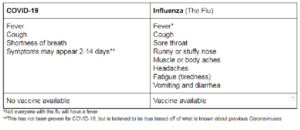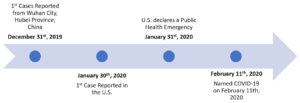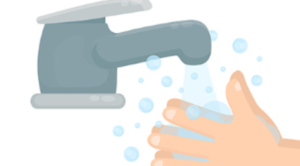
Coronavirus disease 2019 (COVID-19)
Coronavirus is a respiratory illness that can spread from person to person. Coronavirus disease 2019 has been
re-named to COVID-19, which stands for ‘CO’ for Corona, ‘VI’ for ‘virus’ and ‘D’ for disease. It is caused by a novel coronavirus, meaning that the virus has not been previously identified. Coronaviruses are a large family of viruses. Some cause illness in people and others circulate among animals, including camels, cats and bats. The novel virus that causes COVID-19 is severe acute respiratory syndrome coronavirus 2 (SARS-CoV-2). While healthcare workers are always at risk due to close contact with those who may be sick, the risk for the general American public is low at this time. Nevertheless, we should always use precautions if we are sick and are around anyone who is sick.
What are the symptoms of COVID-19?
Some of the symptoms of COVID-19 are similar to influenza or the common cold. Below is a comparison chart of symptoms for influenza and COVID-19. COVID-19 can present as a mild to severe respiratory illness, like pneumonia in both lungs.


How does COVID-19 spread?
Similar to the influenza virus this coronavirus:
- Thought to spread mainly via person-to-person — persons within about 6 feet of one another
- Respiratory droplets produced via coughs or sneezes
- It can possibly be spread from contact with infected surfaces when a person then touches their mouth, nose or possibly eyes (not the main way the virus is thought to be spread)
- It is believed that people are most contagious when they are the most symptomatic, but it may still be possible to spread the virus before people show symptoms
We have a long history with influenza virus, so we can understand when infected persons are more likely to be contagious. However, with the COVID-19 virus we do not yet have enough information to know those specifics. To learn more about how the flu spreads: https://www.cdc.gov/flu/about/disease/spread.htm
How can I protect myself and others from COVID-19?
Similar to how we prevent other diseases and spread of the influenza virus, we can take simple everyday preventative action with the following steps: - Avoid close contact with people who are sick
- Avoid touching eyes, nose and mouth
- Stay home when you are sick
- Avoid contact with those at highest risk for complications
- Young children
- Elderly
- Pregnant women
- Those with weak immune systems
- Cover your cough or sneeze with a tissue, then throw the tissue in the trash
- If no tissue is available, cough or sneeze into your upper sleeve, not your hands
- Clean and disinfect frequently touched objects and surfaces
- Wash your hands often with soap and water for at least 20 seconds, especially after going to the bathroom, before eating and after blowing your nose, coughing or sneezing
- If no soap and water are available, use an alcohol-based hand sanitizer with at least 60% alcohol
- Always wash hands with soap and water if hands are visibly dirty

Should I wear a mask to protect myself from COVID-19?
The CDC does not recommend people who are well to wear a face mask to protect themselves from respiratory illness unless a healthcare professional recommends it. People who already have COVID-19 and have symptoms should wear a facemask to protect others from infection.
Things to keep in mind regarding the use of masks:
- People tend to touch their face more when wearing masks, which can increase the risk of spreading the virus from mouth/nose to hands
- Clean hands prior to adjusting mask and be mindful to refrain from frequently touching your mask
- Always dispose of used masks and wash hands after removing
- Not all masks are equally capable of preventing infection — N95 is preferred to prevent the transmission of small particles, but surgical masks still offer some protection against droplets, splashes or sprays of body fluids
To learn more about respiratory protection: Respirator Use FAQ
To learn more about differences between N95 respirator masks and surgical masks: Understand Difference

COVID-19: Too Close To Home?
Click here to learn more about COVID-19 in the United States.
Although the risk is for COVID-19 is low, it is currently the flu and respiratory disease season. Compared to COVID-19, the CDC estimates that there have already been at least 29 million flu illnesses and at least 16,000 flu deaths since the start of the flu season in October 2019.
While the two viruses may seem unrelated, the CDC recommends the following to respond to the emerging public health threat of COVID-19:
- Get the flu vaccine
- Take everyday preventative actions to help stop the spread of germs
- Take flu medicine, if prescribed by your doctor
If you have not received your annual flu shot yet, stop by Bremo Pharmacy today!
What should I do if I am planning to travel abroad soon?
- Prepare by educating yourself about the everyday preventative action steps to take to minimize your risk of infection
- Consider postponing travel if sick, consult your doctor if you are unsure
- Schedule an appointment for a travel consult at Bremo Pharmacy, so we can make sure you know what you need to know to stay safe and healthy
- Plan extra time at the airport, they are taking extra precautions to ensure the virus does not spread
- Visit the CDC website for specifics regarding COVID-19 for travelers



